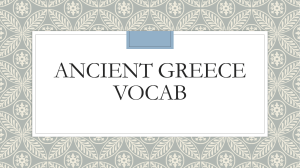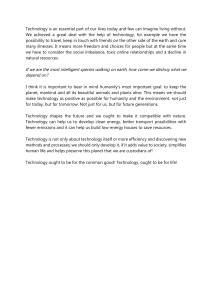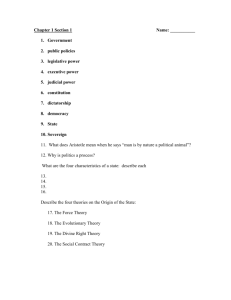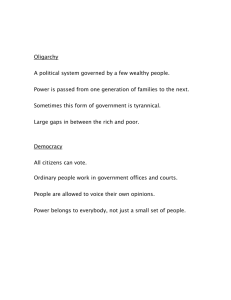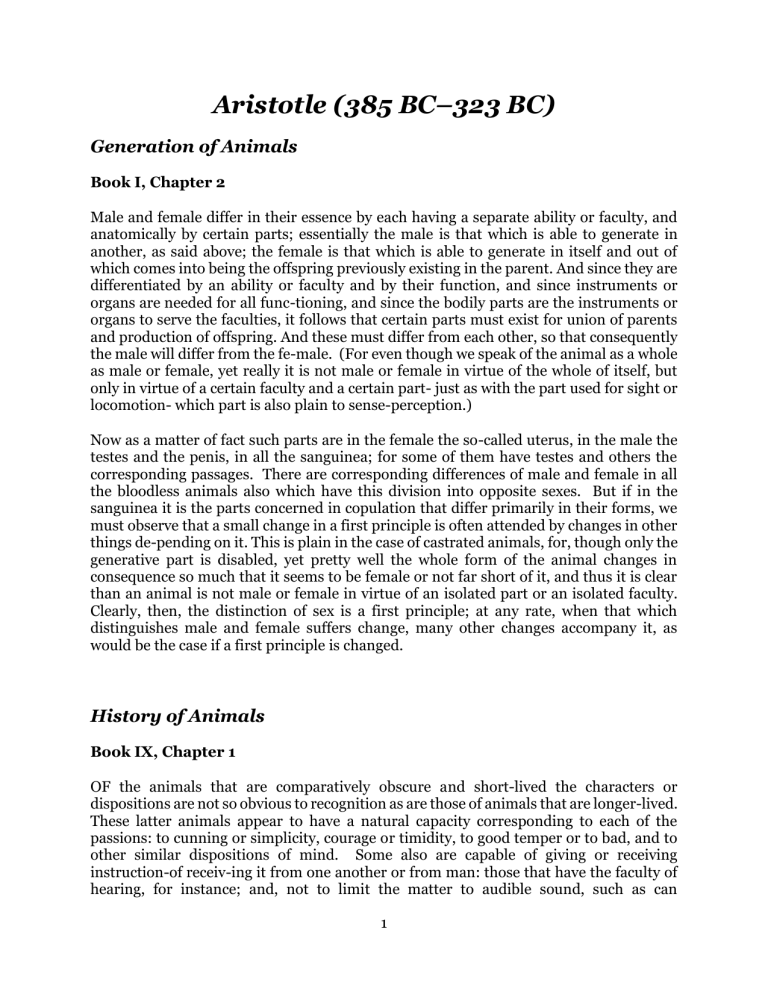
Aristotle (385 BC–323 BC)
Generation of Animals
Book I, Chapter 2
Male and female differ in their essence by each having a separate ability or faculty, and
anatomically by certain parts; essentially the male is that which is able to generate in
another, as said above; the female is that which is able to generate in itself and out of
which comes into being the offspring previously existing in the parent. And since they are
differentiated by an ability or faculty and by their function, and since instruments or
organs are needed for all func-tioning, and since the bodily parts are the instruments or
organs to serve the faculties, it follows that certain parts must exist for union of parents
and production of offspring. And these must differ from each other, so that consequently
the male will differ from the fe-male. (For even though we speak of the animal as a whole
as male or female, yet really it is not male or female in virtue of the whole of itself, but
only in virtue of a certain faculty and a certain part- just as with the part used for sight or
locomotion- which part is also plain to sense-perception.)
Now as a matter of fact such parts are in the female the so-called uterus, in the male the
testes and the penis, in all the sanguinea; for some of them have testes and others the
corresponding passages. There are corresponding differences of male and female in all
the bloodless animals also which have this division into opposite sexes. But if in the
sanguinea it is the parts concerned in copulation that differ primarily in their forms, we
must observe that a small change in a first principle is often attended by changes in other
things de-pending on it. This is plain in the case of castrated animals, for, though only the
generative part is disabled, yet pretty well the whole form of the animal changes in
consequence so much that it seems to be female or not far short of it, and thus it is clear
than an animal is not male or female in virtue of an isolated part or an isolated faculty.
Clearly, then, the distinction of sex is a first principle; at any rate, when that which
distinguishes male and female suffers change, many other changes accompany it, as
would be the case if a first principle is changed.
History of Animals
Book IX, Chapter 1
OF the animals that are comparatively obscure and short-lived the characters or
dispositions are not so obvious to recognition as are those of animals that are longer-lived.
These latter animals appear to have a natural capacity corresponding to each of the
passions: to cunning or simplicity, courage or timidity, to good temper or to bad, and to
other similar dispositions of mind. Some also are capable of giving or receiving
instruction-of receiv-ing it from one another or from man: those that have the faculty of
hearing, for instance; and, not to limit the matter to audible sound, such as can
1
differentiate the suggested meanings of word and gesture. In all genera in which the
distinction of male and female is found, Nature makes a similar differentiation in the
mental characteristics of the two sexes. This differentiation is the most obvious in the case
of human kind and in that of the larger animals and the viviparous quadrupeds. In the
case of these latter the female softer in character, is the sooner tamed, admits more readily
of caressing, is more apt in the way of learning; as, for instance, in the Laconian breed of
dogs the female is cleverer than the male. Of the Molossian breed of dogs, such as are
employed in the chase are pretty much the same as those elsewhere; but sheep-dogs of
this breed are superior to the others in size, and in the courage with which they face the
attacks of wild animals.
Dogs that are born of a mixed breed between these two kinds are remarkable for courage
and endurance of hard labour. In all cases, excepting those of the bear and leopard, the
female is less spirited than the male; in regard to the two exceptional cases, the superiority
in courage rests with the female. With all other animals the female is softer in disposition
than the male, is more mischie-vous, less simple, more impulsive, and more attentive to
the nurture of the young: the male, on the other hand, is more spirited than the female,
more savage, more simple and less cunning. The traces of these differentiated
characteristics are more or less visible every-where, but they are especially visible where
character is the more developed, and most of all in man. The fact is, the nature of man is
the most rounded off and com-plete, and consequently in man the qualities or capacities
above re-ferred to are found in their perfection. Hence woman is more com-passionate
than man, more easily moved to tears, at the same time is more jealous, more querulous,
more apt to scold and to strike. She is, furthermore, more prone to despondency and less
hopeful than the man, more void of shame or self-respect, more false of speech, more
deceptive, and of more retentive memory. She is also more wakeful, more shrinking, more
difficult to rouse to action, and re-quires a smaller quantity of nutriment.
As was previously stated, the male is more courageous than the female, and more
sympathetic in the way of standing by to help. Even in the case of mollusks, when the
cuttle-fish is struck with the trident the male stands by to help the female; but when the
male is struck the female runs away.
Oeconomica
Book 1, Chapter 2
The component parts of a household are man and property. But since the nature of any
given thing is most quickly seen by taking its smaller parts, this would also apply to a
household. So, according to Hesiod, it would be necessary that there should be
First and foremost a house, then a wife…
2
for the former is the first condition of substinence, the latter is the proper possession of
all freemen. We should have, therefore, as a part of economics to make proper rules for
the association of husband and wife, and this involves providing what sort of a woman
she ought to be.
In regard to property the first care is that which comes naturally. Now in the course of
nature the art of acrigulture is prior, and next come those arts which extract the products
of the earth, mining and the like. Agriculture ranks-first because of its injustice, for it does
not take anything away from men, either with their consent, as do retail trading and the
mercenary arts, or against their will, as do the warlike arts. Further, agriculture is natural;
for by nature all derive their sustenance from their mother, and so men dervive it from
the earth. In addition to this it also conduces greatly to bravery; for it does not make men’s
bodies unserviceable, as do the illiberal arts, but it renders them able to lead an open-air
life and work hard; furthermore, it makes them adventurous against the foe, for
husbandmen are the only citizens whose property lies outside the fortifications.
Book 1, Chapter 3
As regards the human part of the household, the first care is concerning the wife; for a
common life is above all things natural to the female and to the male. For we have
elsewhere laid down the principle that nature aims at producing many forms of
association, just as also it produces the various kinds of animals. But it is impossible for
the female to accomplish this without the male or the male without the female, so that
their common life has necessarily arisen. Now in the other animals this intercourse is not
based on reason but depends on the amount of natural instinct which they possess and is
entirely for the purpose of procreation. But in the civilized and more intelligent animals
the bond of unity is more perfect (for in them we see more mutual help and goodwill and
co-operation), above all in the case of man, because the female and the male cooperate to
ensure not merely existence but a good life. And the production of children is not only a
way of serving nature but also of securing a real advantage, for the trouble which parents
bestow upon their helpless children when they are themselves vigorous is repaid to them
in old age when they are helpless by their children, who are then in their full vigor. At the
same time also nature thus periodically provides for the perpetuation of mankind as a
species, since she cannot do so individually. The nature both of the man and of the woman
has been preordained by the will of heaven to live a common life. For they are
distinguished in that the powers which they possess are not applicable to purposes in all
cases identical, but in some respects their functions are opposed to one another though
they all tend to the same end. For nature has made the one sex stronger, the other weaker,
that the latter through fear may be the more cautious, while the former by its courage is
better able to ward of attacks, and that one may acquire possessions outside the house,
the other preserves those within. In the performance of work, she made one sex able to
lead a sedentary life and not strong enough to endure exposure, the other less adapted for
quiet life but well constituted for outdoor activities; and in relation to offspring she has
made both share in the procreation of children, but each render its peculiar service
towards them, the woman by nurturing, the man by educating them.
Book 1, Chapter 4
3
First, then, there are certain laws to be observed towards a wife, including the avoidance
of doing her any wrong; for thus a man is less likely himself to be wronged. This is
inculcated by the general law, as the Pythagoreans say, that one least of all should injure
a wife as being ‘a suppliant and seated at the hearth.’ Now wrong inflicted by a husband
is the formation of connections outside his own house. As regards sexual intercourse, a
man ought not to accustom himself not to need it at all nor to be unable to rest when it is
lacking, but so as to be content with or without it. The saying of Hesiod is a good one:
A man should marry a maiden, that habits discreet he may teach her.
For dissimilarity of habit tends more than anything to destroy affection. As regards
adornment, husband and wife ought not to approach one another with false affectation in
their person any more than in their manners, for if society of husband and wife requires
embellishment, it is no better than play-acting on the tragic stage.
Politics
Book 1
EVERY STATE is a community of some kind, and every community is established with a
view to some good; for mankind always act in order to obtain that which they think good.
But, if all communities aim at some good, the state or political community, which is the
highest of all, and which embraces all the rest, aims at good in a greater degree than any
other, and at the highest good.
....
The state is by nature clearly prior to the family and to the individual, since the whole is
of necessity prior to the part; for example, if the whole body be destroyed, there will be no
foot or hand, except in an equivocal sense, as we might speak of a stone hand; for when
destroyed the hand will be no better than that. But things are defined by their working
and power; and we ought not to say that they are the same when they no longer have their
proper quality, but only that they have the same name. The proof that the state is a
creation of nature and prior to the individual is that the individual, when isolated, is not
self-sufficing; and therefore he is like a part in relation to the whole. But he who is unable
to live in society, or who has no need because he is sufficient for himself, must be either a
beast or a god: he is no part of a state. A social instinct is implanted in all men by nature,
and yet he who first founded the state was the greatest of benefactors. For man, when
perfected, is the best of animals, but, when separated from law and justice, he is the worst
of all; since armed injustice is the more dangerous, and he is equipped at birth with arms,
meant to be used by intelligence and virtue, which he may use for the worst ends.
Wherefore, if he have not virtue, he is the most unholy and the most savage of animals,
and the most full of lust and gluttony. But justice is the bond of men in states, for the
4
administration of justice, which is the determination of what is just, is the principle of
order in political society.
....
Almost all things rule and are ruled according to nature. But the kind of rule differs; the
freeman rules over the slave after another manner from that in which the male rules over
the female, or the man over the child; although the parts of the soul are present in an of
them, they are present in different degrees. For the slave has no deliberative faculty at all;
the woman has, but it is without authority, and the child has, but it is immature. So it
must necessarily be supposed to be with the moral virtues also; all should partake of them,
but only in such manner and degree as is required by each for the fulfillment of his duty.
. . . The temperance of a man and of a woman, or the courage and justice of a man and of
a woman, are not, as Socrates maintained, the same; the courage of a man is shown in
commanding, of a woman in obeying. . . . All classes must be deemed to have their special
attributes; as the poet says of women, "Silence is a woman's glory," but this is not equally
the glory of man.
....
Book 3
Is he only a true citizen who has a share of office, or is the mechanic to be included? If
they who hold no office are to be deemed citizens, not every citizen can have this virtue of
ruling and obeying. . . . May we not reply, that as far as this objection goes there is no
more absurdity in excluding them than in excluding slaves and freedmen. . .? It must be
admitted that we cannot consider all those to be citizens who are necessary to the
existence of the state; for example, children are not citizen equally with grown-up men,
who are citizens absolutely, but children, not being grown up, are only citizens on a certain
assumption. . . . The best form of state will not admit [artisans] to citizenship; but if they
are admitted, then our definition of the virtue of a citizen will not apply to every citizen
nor to every free man as such, but only to those who are freed from necessary services.
....
{5}We have already said, in the first part of this treatise, when discussing household
management and the rule of a master, that man is by nature a political animal. And
therefore, men, even when they do not require one another's help, desire to live together;
not but that they are also brought together by their common interests in proportion as
they severally attain to any measure of well-being. This is certainly the chief end, both of
individuals and of states. And also for the sake of mere life (in which there is possibly
some noble element so long as the evils of existence do not greatly overbalance the good)
mankind meet together and maintain the political community. And we all see that men
5
cling to life even at the cost of enduring great misfortune, seeming to find in life a natural
sweetness and happiness.
....
The words constitution and government have the same meaning, and the government,
which is the supreme authority in states, must be in the hands of one, or of a few, or of
the many. The true forms of government, therefore, are those in which the one, or the few,
or the many, govern with a view to the common interest; but governments which rule with
a view to the private interest, whether of the one or of the few, or of the many, are
perversions. For the members of a state, if they are truly citizens, ought to participate in
its advantages. Of forms of government in which one rules, we call that which regards the
common interests, kingship or royalty; that in which more than one, but not many, rule,
aristocracy; and it is so called, either because the rulers are the best men, or because they
have at heart the best interests of the state and of the citizens. But when the citizens at
large administer the state for the common interest, the government is called by the
generic name- a constitution. And there is a reason for this use of language. One man or
a few may excel in virtue; but as the number increases it becomes more difficult for them
to attain perfection in every kind of virtue, though they may in military virtue, for this is
found in the masses. Hence in a constitutional government the fighting-men have the
supreme power, and those who possess arms are the citizens.
Of the above-mentioned forms, the perversions are as follows: of royalty, tyranny; of
aristocracy, oligarchy; of constitutional government, democracy. For tyranny is a kind of
monarchy which has in view the interest of the monarch only; oligarchy has in view the
interest of the wealthy; democracy, of the needy: none of them the common good of all.
....
Book 4
We have now to inquire what is the best constitution for most states, and the best life for
most men, neither assuming a standard of virtue which is above ordinary persons, nor an
education which is exceptionally favored by nature and circumstances, nor yet an ideal
state which is an aspiration only, but having regard to the life in which the majority are
able to share, and to the form of government which states in general can attain. . . .
Now in all states there are three elements: one class is very rich, another very poor, and a
third in a mean. It is admitted that moderation and the mean are best, and therefore it
will clearly be best to possess the gifts of fortune in moderation; for in that condition of
life men are most ready to follow rational principle. But he who greatly excels in beauty,
strength, birth, or wealth, or on the other hand who is very poor, or very weak, or very
much disgraced, finds it difficult to follow rational principle. Of these two the one sort
grow into violent and great criminals, the others into rogues and petty rascals. And two
sorts of offenses correspond to them, the one committed from violence, the other from
roguery. Again, the middle class is least likely to shrink from rule, or to be over-ambitious
for it; both of which are injuries to the state. Again, those who have too much of the goods
6
of fortune, strength, wealth, friends, and the like, are neither willing nor able to submit to
authority. The evil begins at home; for when they are boys, by reason of the luxury in
which they are brought up, they never learn, even at school, the habit of obedience. On
the other hand, the very poor, who are in the opposite extreme, are too degraded. So that
the one class cannot obey, and can only rule despotically; the other knows not how to
command and must be ruled like slaves. Thus arises a city, not of freemen, but of masters
and slaves, the one despising, the other envying; and nothing can be more fatal to
friendship and good fellowship in states than this: for good fellowship springs from
friendship; when men are at enmity with one another, they would rather not even share
the same path. But a city ought to be composed, as far as possible, of equals and similars;
and these are generally the middle classes. Wherefore the city which is composed of
middle-class citizens is necessarily best constituted in respect of the elements of which we
say the fabric of the state naturally consists. And this is the class of citizens which is most
secure in a state, for they do not, like the poor, covet their neighbors' goods; nor do others
covet theirs, as the poor covet the goods of the rich; and as they neither plot against others,
nor are themselves plotted against, they pass through life safely. Wisely then did
Phocylides pray- 'Many things are best in the mean; I desire to be of a middle condition
in my city.'
Thus it is manifest that the best political community is formed by citizens of the middle
class, and that those states are likely to be well-administered in which the middle class is
large, and stronger if possible than both the other classes, or at any rate than either singly;
for the addition of the middle class turns the scale, and prevents either of the extremes
from being dominant. Great then is the good fortune of a state in which the citizens have
a moderate and sufficient property; for where some possess much, and the others nothing,
there may arise an extreme democracy, or a pure oligarchy; or a tyranny may grow out of
either extreme- either out of the most rampant democracy, or out of an oligarchy; but it
is not so likely to arise out of the middle constitutions and those akin to them. I will
explain the reason of this hereafter, when I speak of the revolutions of states. The mean
condition of states is clearly best, for no other is free from faction; and where the middle
class is large, there are least likely to be factions and dissensions. For a similar reason
large states are less liable to faction than small ones, because in them the middle class is
large; whereas in small states it is easy to divide all the citizens into two classes who are
either rich or poor, and to leave nothing in the middle. And democracies are safer and
more permanent than oligarchies, because they have a middle class which is more
numerous and has a greater share in the government; for when there is no middle class,
and the poor greatly exceed in number, troubles arise, and the state soon comes to an end.
....
Book 6
The basis of a democratic state is liberty; which, according to the common opinion of men,
can only be enjoyed in such a state; this they affirm to be the great end of every democracy.
One principle of liberty is for all to rule and be ruled in turn, and indeed democratic justice
is the application of numerical not proportionate equality; whence it follows that the
majority must be supreme, and that whatever the majority approve must be the end and
7
the just. Every citizen, it is said, must have equality, and therefore in a democracy the
poor have more power than the rich, because there are more of them, and the will of the
majority is supreme. This, then, is one note of liberty which all democrats affirm to be the
principle of their state. Another is that a man should live as he likes. This, they say, is the
privilege of a freeman, since, on the other hand, not to live as a man likes is the mark of a
slave. This is the second characteristic of democracy, whence has arisen the claim of men
to be ruled by none, if possible, or, if this is impossible, to rule and be ruled in turns; and
so it contributes to the freedom based upon equality.
....
Next comes the question, how is this equality to be obtained? Are we to assign to a
thousand poor men the property qualifications of five hundred rich men? and shall we
give the thousand a power equal to that of the five hundred? or, if this is not to be the
mode, ought we, still retaining the same ratio, to take equal numbers from each and give
them the control of the elections and of the courts?- Which, according to the democratical
notion, is the juster form of the constitution- this or one based on numbers only?
Democrats say that justice is that to which the majority agree, oligarchs that to which the
wealthier class; in their opinion the decision should be given according to the amount of
property. In both principles there is some inequality and injustice. For if justice is the will
of the few, any one person who has more wealth than all the rest of the rich put together,
ought, upon the oligarchical principle, to have the sole power- but this would be tyranny;
or if justice is the will of the majority, as I was before saying, they will unjustly confiscate
the property of the wealthy minority. To find a principle of equality which they both agree
we must inquire into their respective ideas of justice.
....
The mere establishment of a democracy is not the only or principal business of the
legislator, or of those who wish to create such a state, for any state, however badly
constituted, may last one, two, or three days; a far greater difficulty is the preservation of
it. The legislator should therefore endeavor to have a firm foundation according to the
principles already laid down concerning the preservation and destruction of states; he
should guard against the destructive elements, and should make laws, whether written or
unwritten, which will contain all the preservatives of states. He must not think the truly
democratical or oligarchical measure to be that which will give the greatest amount of
democracy or oligarchy, but that which will make them last longest.
....
Book 7
First among the materials required by the statesman is population: he will consider what
should be the number and character of the citizens, and then what should be the size and
character of the country. Most persons think that a state in order to be happy ought to be
large; but even if they are right, they have no idea what is a large and what a small state.
For they judge of the size of the city by the number of the inhabitants; whereas they ought
8
to regard, not their number, but their power. A city too, like an individual, has a work to
do; and that city which is best adapted to the fulfillment of its work is to be deemed
greatest, in the same sense of the word great in which Hippocrates might be called greater,
not as a man, but as a physician, than some one else who was taller And even if we reckon
greatness by numbers, we ought not to include everybody, for there must always be in
cities a multitude of slaves and sojourners and foreigners; but we should include those
only who are members of the state, and who form an essential part of it. The number of
the latter is a proof of the greatness of a city; but a city which produces numerous artisans
and comparatively few soldiers cannot be great, for a great city is not to be confounded
with a populous one. Moreover, experience shows that a very populous city can rarely, if
ever, be well governed; since all cities which have a reputation for good government have
a limit of population. We may argue on grounds of reason, and the same result will follow.
For law is order, and good law is good order; but a very great multitude cannot be orderly:
to introduce order into the unlimited is the work of a divine power- of such a power as
holds together the universe. Beauty is realized in number and magnitude, and the state
which combines magnitude with good order must necessarily be the most beautiful. To
the size of states there is a limit, as there is to other things, plants, animals, implements;
for none of these retain their natural power when they are too large or too small, but they
either wholly lose their nature, or are spoiled. For example, a ship which is only a span
long will not be a ship at all, nor a ship a quarter of a mile long; yet there may be a ship of
a certain size, either too large or too small, which will still be a ship, but bad for sailing.
In like manner a state when composed of too few is not, as a state ought to be, selfsufficing; when of too many, though self-sufficing in all mere necessaries, as a nation may
be, it is not a state, being almost incapable of constitutional government.
9

